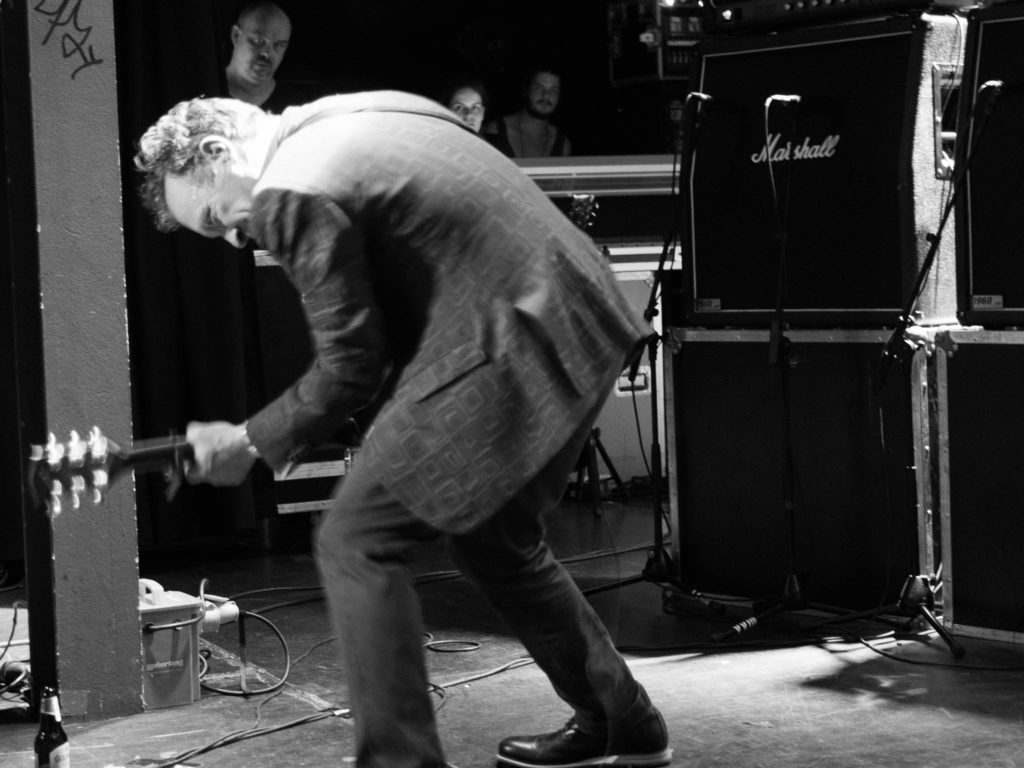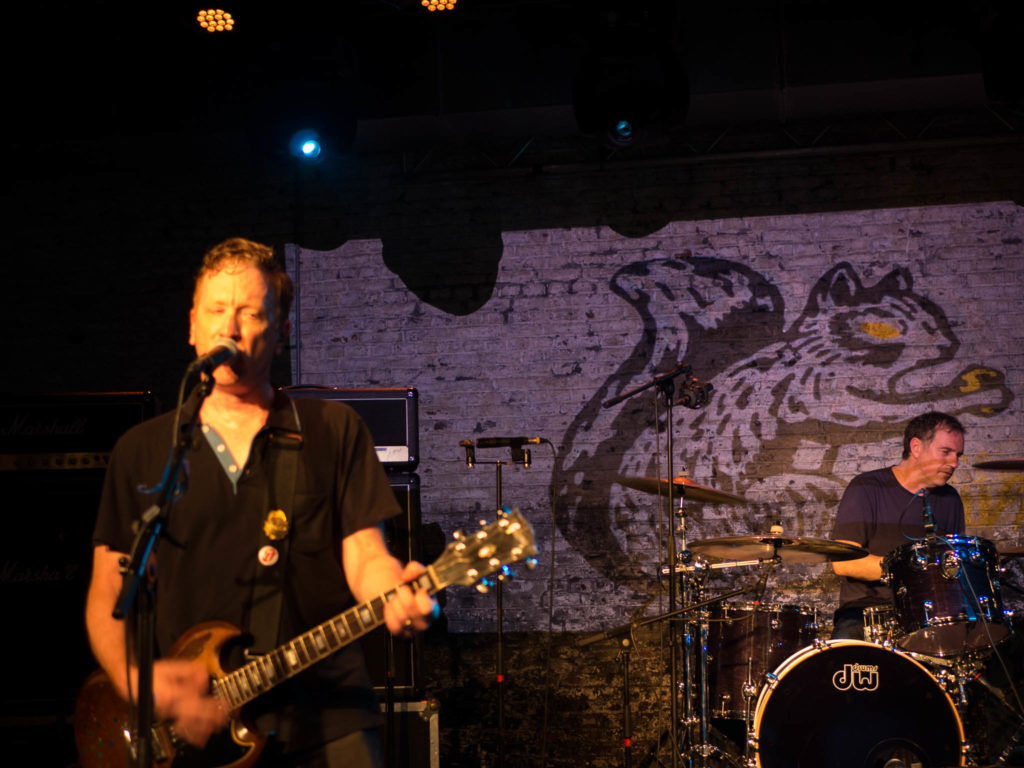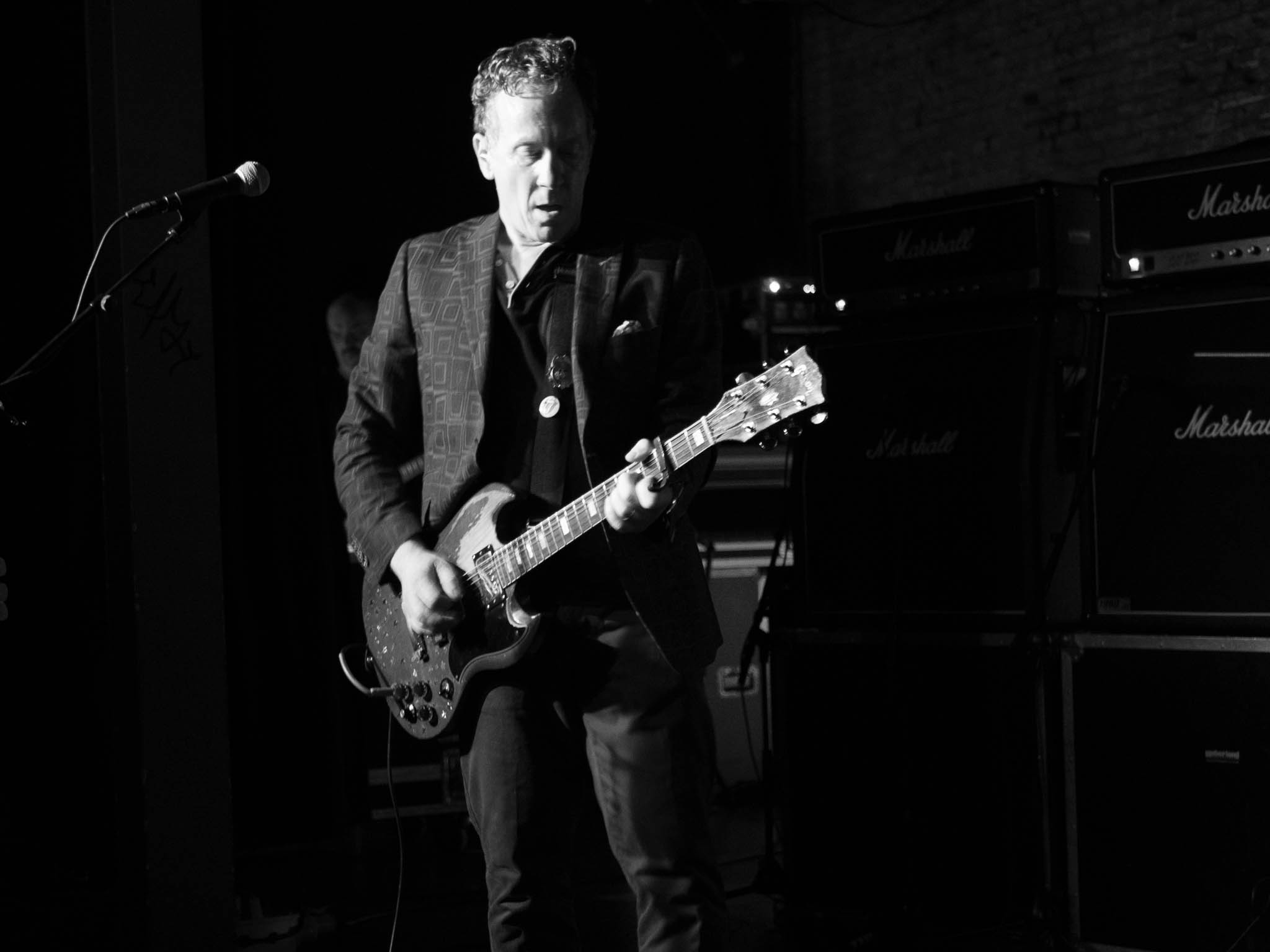Do you get this feeling too? You have listened to a certain album so many times that the first little sound of just one song off it, makes your mind explode with the memories of that time of your life. Sometimes I do not want to listen to that album later on in my life for the simple reason that I fear I might dilute those strong sentiments. This has been the case for many albums in my case, but certainly for the threesome of “Let Me Come Over”, “Big Red Letter Day” and “Sleepy Eyed” by one of Boston’s and indeed the US’ finest bands Buffalo Tom. I have found though that their later albums (spread over the years since Buffalo Tom are not fully in the music business alone anymore) appealed to me as well, Buffalo Tom having of course grown up too. Since Buffalo Tom do still play their old songs and graced Europe with a rare set of performances (25th anniversary of “Let Me Come Over”), I went to their gig (giddily excited like everyone else in the series of sold-out shows in Europe). Are you ready? Buffalo Tom play Muziekgieterij Maastricht plus interview.

Okay, I am ready to listen to the old songs again. Why? Because Bill Janovitz, Chris Colbourn and Tom Maginnis, just the three of them, without much ado, delivered a burning set of old and new songs. And the old songs have stayed so fresh despite being delivered very true to the originals. Buffalo Tom songs can take a lot memories of a lot of people and there is room for new experiences too.
Thank you so much Buffalo Tom for this amazing gig and everyone at Muziekgieterij too for being such a lovely venue of real music enthusiasts and of course another thank you to Bill Janovitz for the following interview!

Offbeat Music Blog: Thank you very much, Bill, for taking the time for a chat. We are all looking forward to Buffalo Tom’s show tonight here in Maastricht/Netherlands. You seem to have a very loyal fanbase in Belgium and the Netherlands. How come?
Buffalo Tom’s Bill Janovitz: Thank you. I don’t know! You should tell me (laughs)! There are a couple of things: American guitar rock was already fairly popular on an indie level in the Netherlands and Belgium and Germany and the UK when we started in the late eighties. We signed to a label out of the Netherlands, run by a Belgian guy, Megadisc Records. We signed to them and SST in America at around the same time. That was really our first entree to Europe. Also we were produced by J Mascis on our first two albums and he already had some leeway here in Europe. So people were interested in that respect. And we actually had a Dutch promoter to our first tour, the Paperclip people. There was already a circuit for people plus we had the fortune to sign to a Dutch label and the Play It Again Sam people were all involved. We had a good leg up here but the music, I think, appealed to people and I think, they were ready for this kind of thing, at least on the level that we were at.
OMB: I heard you first on a Belgian radio station in the mid-eighties. I think we are about the same age. Belated happy birthday by the way. You were going straight on a tour after your birthday. That must have been pretty rough.
Bill: Nooo, no, it’s a good thing. At this point, a tour of a week is a vacation for me. This is all my birthday week. I love playing music live. You know, we don’t have to tour for months and months at a time like we used to. So, at fifty-one, it’s like…I have a friend who is just here for the ride. He came along because he is having a good time. My friends look at this like: Wow, you get to play to thousands of people or hundreds of people and you tour around and drink beer and have fun and meet people. That’s what touring was when we started. But it gets old very quickly especially when you tour for a month, then go home for a week and then you do another month and then ten years of that. Then it gets burning out.
OMB: You are celebrating the 25th anniversary of your third album “Let Me Come Over”. Did you celebrate the anniversaries of the first two albums as well?
Bill: (Laughs). No, no. We might want to do an anniversary of “Big Red Letter Day” (4th album) because that was a big record for us. I don’t know. At this point it is just an excuse to go out (chuckles).
OMB: Some people also say, that on the third album you found your distinctive voice. The first two albums were fine but it was really Buffalo Tom from the third album on.
Bill: Yeah, that’s right. It is kind of our breakthrough artistic record, for sure.
OMB: Did you have to rehearse or did you often play the songs of that third album?
Bill: Most of “Let Me Come Over” we know like the back of our hand but there are some songs that we had to rehearse. Then there are some songs we thought we knew. We just soundchecked now and we soundchecked “Staples” and we were looking at each other, asking “Do you we end here or do you we keep going?” Certain things like that: As soon as you start thinking about it, it is no longer muscle memory and you start to question yourself. But a lot of it is just muscle memory. It is just a matter of reminding yourself and the ball rolls. So most of “Let Me Come Over” we have played but some songs we have not played much at all after that initial tour.
OMB: After “Let Me Come Over” came the two big commercial successes “Big Red Letter Day” and “Let Me Come Over” and then after that “Smitten”. Then, for a long time, there was nothing. Had you decided, okay, we are doing music on the side now.
Bill: Sort of. I don’t think we were that absolute about it. We were more burned out and said, let’s concentrate on our families for now. I had a kid that was being born that year, 1999, and Tom (Maginnis) already had two kids. We were just really tired of it all. It had gone on for longer than we expected. We didn’t say “Let’s break up” or “Let’s do this for a hobby”. It was more like Let’s give this a break for now, Let’s not rush back into the studio. We certainly did not. We did not have another record out for five or almost ten more years. But we kept playing and we would do a few shows here and there, even did little tours. We did this cover of “Going Underground” by The Jam. So we did things like that and always played around Boston. We went on to other jobs and in doing so, getting off that cycle, made music just so much more enjoyable again.
OMB: Maybe because the pressure was off? Probably explains why you three are still playing together and did not start to fight?
Bill: Yeah, that’s right. We might have just done irreparable harm back then. And the fact that we didn’t have a huge hit…it would have been nice to have a huge hit from the financial perspective because then you can do music on your own terms as well. I am friendly with Eddie Vedder. I look at this as a kind of ideal of success. He can go and play smaller places himself and still theatres and things. So he can get that experience. Also he can go “I can make whatever kind of record I want” and they make lots and lots of money. I don’t know if it would have been a good thing for Buffalo Tom or not. I think we are very level-headed, so who knows.
OMB: Your music was independent of any fashion which in the long run was a good thing because you are still there.
Bill: I think we were always more interested in classic kind of things, timeless, not necessarily classic. We were interested in the timeless aspects of music. We loved new sounds and experimenting with new sounds and bands that experimented, artists like My Bloody Valentine. You always want to push that. But we always wanted to write good songs, songs that lasted. “Let Me Come Over” is an interesting example of what you are talking about. At the time Nirvana and the grunge scene were really taking off and we were going back to more acoustic guitar. We double-downed with that idea on “Big Red Letter Day”, made it even more real classic sounding and I think those records hold up very well.
OMB: They do. They stay very fresh. Or do you have songs that you cannot identify with anymore?
Bill: Oh yeah, for sure! Especially those first two records (Buffalo Tom and Birdbrain) where you are still finding your way through. What are we? That’s why “Let Me Come Over” was such a breakthrough because we really coalesced into a thing. On the first two records you are sort of experimenting. Especially “Birdbrain”: It had more darkness to it than there really was about the band, I think. It was a little more grungy than Buffalo Tom actually tended to be. There is song called “Directive” which we don’t play. It is not that I dislike the song or a guy who is me from that record. We just quickly went through them. The other thing about the first two records for any band is, that is all you have for material. That’s basically a set. So you play these songs over and over again and by the time you get into the third, fourth, fifth record, you have all these songs to choose from. We are now on the ninth record and we try and work in some new songs too.
OMB: The albums “Three Easy Pieces” and “Skins” were then spread out over a number of years. How did you find your approach to making a record had changed, not only technologically but also maybe atmospherically?
Bill: The primary thing is, it is all digital. So you can make records at home or at least record sounds at home that are arguably better than our first record’s technology when it was still primitive. It wasn’t so much that technology in general was that primitive. The height of recording technology for me is still the late seventies of analogue. But then digital became so good to where we are now. But the first record was made on very inexpensive analogue equipment. Everybody involved in making the record was sort of inexperienced including the producers and the engineers. It was not a real studio, more like a warehouse space. You were just happy to get the sounds you get. But now, you can take stuff and bring it home and work on it and if the ideas don’t work, that’s fine, because you are not wasting anybody’s time or money. I am no engineer but I know how to get a decent sound with a decent amplifier. And I can sing.
OMB: Are you a bit nostalgic about the old days though? The record shops instead of downloading and streaming, the analogue technology, the music industry, the radio stations?
Bill: Yeah, I mean, I loved the days of spending a Saturday afternoon going to buy records and books and going back to my rented apartment with my girlfriend or my friends. Just having a glass of wine and putting on the new records and reading books and maybe going to a movie. But that was a whole lifestyle of being in my twenties. I don’t know what people in their twenties without kids do now – I am sure there are all kinds of fun things. But I also embraced technology readily. I am kind of an early adopter of things. I love new tools – to a fault. I love Spotify and I love being able to stream music. I think it is a myth that bands, new bands, feel that they missed out on an opportunity to make money. Because we made no royalties from records, you know. You got an advance and if you recouped your advance, then you did not get a very big advance because we were only selling ten, twenty, thirty thousand records. It wasn’t like all of a sudden there was big money in it. I think people make the mistake of thinking, well, if you got played on the radio, you get these royalty cheques from the broadcasters. And that you do get, but that was on the big radio stations. If a couple of people are streaming your…I think, the formulas could be better, don’t get me wrong. I would like to see people getting paid more.
I don’t really get nostalgic for vinyl per se. I understand it and I like to put on records from time to time. But I am much more about streaming music all through my house from my phone and if it sounds good on the high-quality systems I use, high-bit rate and whatever, bla bla bla, the convenience far outweighs – and I am glad to pay ten dollars. Honestly, I would pay twenty dollars a month for the same access. I don’t go buy records anymore, really. I mean, I will, if it helps support a band if they are doing a campaign or that sort of thing. But I don’t really listen to the vinyl anymore. It is located in a part of my house, in the basement.
OMB: Yeah, I keep them there too, looking after them though. I like the feel of vinyl and the look of it. (Me too, says Bill). But I am happy that I can do shows from home and artists can contact me with their music easily. And I can find new music on the internet.
Bill: I don’t know if I would be as adventurous if it was about records. I think I would shut down my mind.
OMB: Sometimes people don’t even get to do records or CDs and they put the music on bandcamp first.
Bill: Then there is that thing. Bandcamp is a great tool. I find a lot of acts that way and I support acts that way. Bandcamp is a great thing because you can put it on any device and listen to it – through Sonos which I use at home.

OMB: I often hear people saying: Buffalo Tom – oh my, they were great, but they were the perennial maids of honour. But the other bands who made it were not exactly swimming in dosh, like Pavement.
Bill: Yeah, Pavement did a very successful reunion tour. They did okay there. But, yeah, you’re right. There were a lot of bands that did not get to our level but they were a lot of bands that opened up for us or supported us that did go on to big time like Pearl Jam, Smashing Pumpkins, Hole. But you know, I wouldn’t trade places and be Smashing Pumpkins. Billy is an interesting guy but I wouldn’t want to be in a band with him. (Sees my uncomfortable face and laughs out loud). And apparently nobody else does here. (Laughs even louder). But he is a very nice guy when I have met him. And we were really enjoying playing with them and Hole.It’s just different. Listen, to be able to go and play to 1700 or 1800 people in Brussels or sell out London or come here…it’s just a gift.
OMB: Yeah, it is great, you go on tour and get packed venues still.
Bill: Yeah, we always admired cult artists like Tom Waits or Nick Cave. Even Van Morrison, he was huge in the seventies, but he still plays to loyal audiences. I would love to achieve that level of respect and be able to fill out a theatre any time. I don’t feel we are there. But I think if we devoted more time to the road, we would. But I think it is nice, I mean, the Paradiso in Amsterdam and so on, I never wanted to get much bigger than that. We have gotten respect over the years. There is nothing I would really change too much.
OMB: How do think your songwriting has changed over the years?
Bill: I think we mostly stayed ninety per cent the same (laughs). The lyrics have changed quite a bit. It reflects our lives and our lives as fifty-year olds are very different than when we were twenty-five. Things about adult concerns get in there. The approach of impressionist and stream-of-consciousness and guitar rock is all sort of the same though. We are writing different stuff now – we have a new record coming out which I think is excellent. So, let’s see.
OMB: Yes, I wanted to keep that secret until last. Because you have a very big surprise, you are working on a new record. It is almost finished?
Bill: Yeah, it’s done and we are having it mixed next week or so by John Agnello (Me: Woohoo!) who actually produced and mixed “Sleepy Eyed”. And he’s obviously done quite a bit since then (laughs). That should be interesting. He is a nice guy. It was a pledge music campaign – a crowd-sourcing thing. It did very well and it is still open if people wanna pledge!
OMB: But you have your own label?
Bill: Yeah, I am not sure who is going to release it. It’s going be us in partnership with somebody maybe.
OMB: Will you play a new song tonight?
Bill, Yeah, I think we will play a song.
OMB: Thank you very much!
Bill: Thank you so much, Alice!

